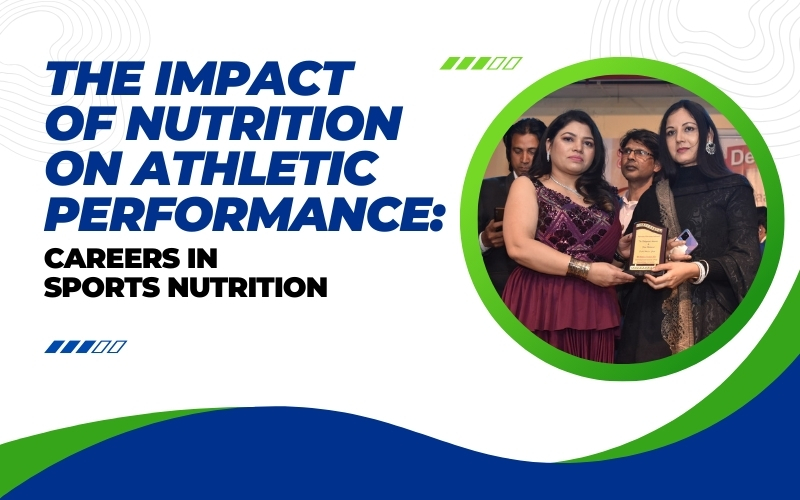Good nutrition affects athletic performance in numerous ways. Proper nutrition fuels athletes and gives them the energy they need to perform at their peak. It helps them maintain their weight, boosts their immune system and aids in muscle building and recovery post workouts. Additionally, a balanced diet helps increase agility, endurance, and strength.

Suppose an athlete fails to meet their nutritional needs. In that case, inadequate fuel can damage their performance, leading to decreased performance in speed, agility, coordination, and strength. Low energy intake can also cause fatigue, cramps, or dehydration. If you are considering building your career in sports Nutrition, go for Diploma in Nutrition and Dietetics Courses.
Why nutrition plays an important role in Athletic performance
Nutrition plays a vital role in athletic performance and is essential for any athlete. Proper nutrition can provide the energy needed to participate in physical activity, maintain energy stores, and promote recovery.
Every nutrient, including carbohydrates, proteins, and fats, is essential for health and performance. Eating a balanced diet designed to meet an athlete’s energy needs can maximize performance, help prevent injury, and help the athlete reach their goals. If a career as a nutritionist in sports excites you, then the best way to upgrade your career is to do a certified nutrition course.
Nutrition plays an essential role in an athlete’s performance. Adequate hydration with water, carbohydrates, proteins, fruits, and vegetables is essential to an athlete’s performance nutrition plan. Skipping meals, eating junk food, and eating foods with a high sugar content can all negatively affect performance. Therefore, it is important to eat balanced meals and snacks regularly throughout the day to ensure you get the nutrition needed to perform at your best.
Tailoring Nutrition for Sport Type
Nutrition needs can vary depending on a person’s sports activities. Those who regularly train and compete at a high level need adequate energy without gastrointestinal discomfort, especially before a significant workout or race. For this reason, athletes need to consume quickly digestible carbs such as bananas and pasta before any activity so they do not experience GI distress.
To get the most out of their performance and recovery, as well as maintain a healthy weight, it is recommended that athletes work with a registered sports dietitian who has nutrition certification to tailor a nutrition plan that works best for their body, sport, and schedule.
Web: Career Opportunities In Nutrition And Dietetics (becomebeautyexpert.com)
Purpose of a Nutrition Plan to Fulfill Sports Performance
Provide energy for training & competition:
Athletes must maintain a healthy and well-rounded diet to perform well in training and competition. Having an adequate daily caloric intake is necessary. Still, it is also important to be aware of the macronutrients, micronutrients, ratios, meal timing and frequency, hydration, and supplementation to optimize an individual’s diet.
Facilitate recovery after training & competition:
Following an intensive match or training, the energy stored in the muscles gets exhausted, and some of the proteins in the muscles get destroyed and harmed.
By fueling up soon after, or even during, practice or competition, the depleted glycogen stores are refilled, which halts muscle protein breakdown and speeds up the recovery process.
Achieve & maintain optimal body weight & composition:
Athletes need to reach the best possible body weight and body fat levels to deliver the highest level of performance. More importantly, a diet plan must be designed so the athlete can stick to it without any difficulties in the long run.
Careers in Sports Nutrition
Sports nutrition offers a range of career pathways for those interested in nutrition that can be tailored to individual interests. Once an individual completes their nutritionist training, they can choose the best career in sports nutrition.
Sports Nutritionist
For those with a scientific background, sports nutritionists can work in research to focus on the health and fitness of athletes, guiding diet plans, nutritional supplementation, and strategies to aid in performance enhancement.
Sports nutritionists can also collaborate with organizations and sports teams to develop nutrition plans and guidelines. They guide proper nutrition and advice on supplements.
Sports Dieticians
Sports dieticians focus on the needs of individual athletes, helping to create personalized dietary plans based on each athlete’s needs. They typically work with trainers and medical staff to guide meal plans and supplementation.
Sports Nutrition Coach
Sports nutrition coaches are also focused on the individual needs of athletes and individuals looking to reach certain fitness goals. They use a combination of nutritional guidance and physical activity regimens to create a personalized plan that aids the individual in reaching their goals and leading a healthier lifestyle.
Sports Nutrition Educators
Sports nutrition educators teach others about the importance of nutrition in reaching athletic and health goals. They can provide classes and seminars to teams, groups, and individuals about proper nutrition and diet plans.
Final Thoughts
Maintaining a healthy, nutritious diet can be important to any athlete’s performance. Sports nutrition can help athletes maximize their performance and enhance their physical condition. As such, there are many opportunities for people interested in pursuing a career in sports nutrition. Sports nutritionists can work in various settings to help athletes of all levels enhance their performance through dietary advice and practices.
Sports nutritionists can also work in clinical settings to help athletes rehabilitate from injuries and manage chronic health conditions. The demand for sports nutritionists is expected to increase as more organizations recognize the importance of proper nutrition in optimizing athlete performance. If you prefer to have a nutritionist career, enroll in MeriBindiya’s nutritionist training course.































